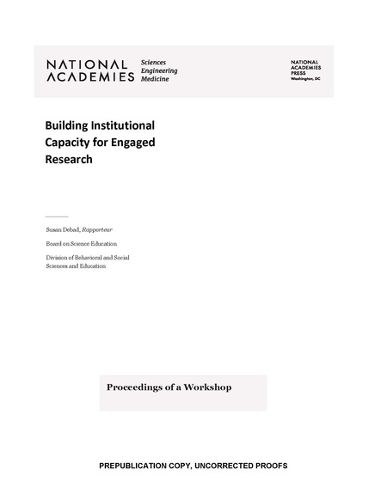Readings Newsletter
Become a Readings Member to make your shopping experience even easier.
Sign in or sign up for free!






The complex challenges facing society today call for new ways of doing research that bring researchers, policy makers, community leaders and members, industry stakeholders, and others together to identify evidence needs, contribute different kinds of knowledge and expertise, and use evidence to accomplish shared goals. Although momentum is building toward a research enterprise that more routinely enables and rewards this type of collaboration, the development of institutional capacities to support diverse forms of engaged research have not kept pace with the need for them.
To explore opportunities for engaged and societally impactful scholarship, the Board on Science Education at the National Academies of Sciences, Engineering, and Medicine convened a workshop, Building Institutional Capacity for Engaged Research in Washington, D.C, held online on June 13 and 14, 2024. A diverse set of leaders and stakeholders from across the research ecosystem shared actionable ideas and innovations that participants could use for building institutional capacity for engaged research in their own in their own institutions and settings and proposed concrete ideas for coordination and capacity building to advance engaged research. This publication summarizes the presentations and discussion of the workshop.
Table of Contents
Front Matter 1 Introduction 2 The Importance of Engaged Research 3 Challenges and Solutions: Synthesizing Two Landscape Reviews 4 Promising Approaches for Addressing Key Tensions in Community-Engaged Research 5 Aligning Mission and Incentives: Valuing and Prioritizing Engaged Research 6 Valuing Diverse Forms of Expertise 7 Aligning Core Values and Measurements 8 Next Steps for Action Appendix A: Workshop Agenda Appendix B: Biosketches of Planning Committee Members and Speakers Appendix C: Participants' Ideas for Metrics of Engaged Research
$9.00 standard shipping within Australia
FREE standard shipping within Australia for orders over $100.00
Express & International shipping calculated at checkout
The complex challenges facing society today call for new ways of doing research that bring researchers, policy makers, community leaders and members, industry stakeholders, and others together to identify evidence needs, contribute different kinds of knowledge and expertise, and use evidence to accomplish shared goals. Although momentum is building toward a research enterprise that more routinely enables and rewards this type of collaboration, the development of institutional capacities to support diverse forms of engaged research have not kept pace with the need for them.
To explore opportunities for engaged and societally impactful scholarship, the Board on Science Education at the National Academies of Sciences, Engineering, and Medicine convened a workshop, Building Institutional Capacity for Engaged Research in Washington, D.C, held online on June 13 and 14, 2024. A diverse set of leaders and stakeholders from across the research ecosystem shared actionable ideas and innovations that participants could use for building institutional capacity for engaged research in their own in their own institutions and settings and proposed concrete ideas for coordination and capacity building to advance engaged research. This publication summarizes the presentations and discussion of the workshop.
Table of Contents
Front Matter 1 Introduction 2 The Importance of Engaged Research 3 Challenges and Solutions: Synthesizing Two Landscape Reviews 4 Promising Approaches for Addressing Key Tensions in Community-Engaged Research 5 Aligning Mission and Incentives: Valuing and Prioritizing Engaged Research 6 Valuing Diverse Forms of Expertise 7 Aligning Core Values and Measurements 8 Next Steps for Action Appendix A: Workshop Agenda Appendix B: Biosketches of Planning Committee Members and Speakers Appendix C: Participants' Ideas for Metrics of Engaged Research